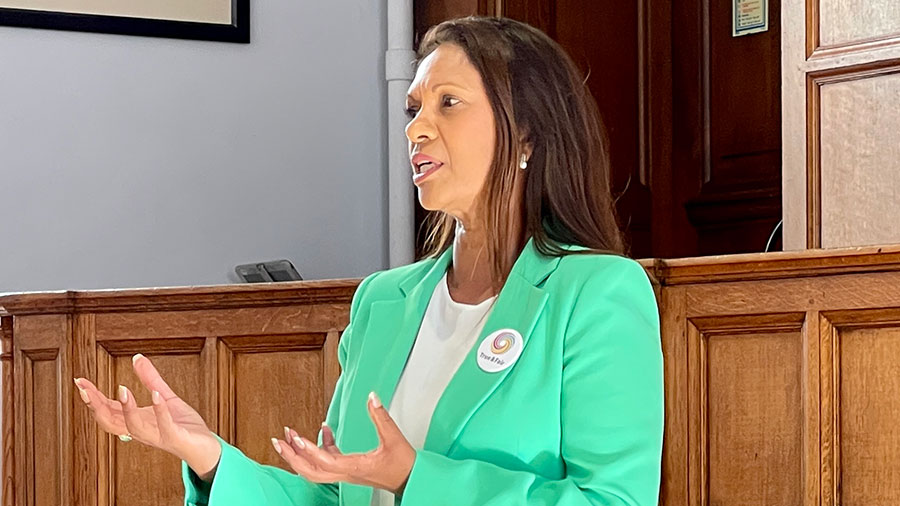Farmers let down by mainstream parties, says Gina Miller
 © True & Fair Party
© True & Fair Party Farmers and rural communities have been given the short end of the stick by the Westminster government and they deserve better, according to the leader of a fledgling political party.
Anti-Brexit campaigner Gina Miller told Farmers Weekly that many people were feeling politically homeless voting for the status quo of political parties – which is why she decided to form the True & Fair Party in September 2021.
“With trust so low at the moment, it seemed a perfect time to set out a stall of a party that’s going to be thinking differently, coming up with new ideas and solutions – and that’s what we want to do,” she said.
See also: Analysis: 7 years after Brexit, farmers count the cost
Two years on from its inception, Ms Miller’s party is embarking on a journey to devise better policies for farmers and rural communities “to improve the countryside, and get a better deal after years of inaction and being let down by the major parties”.
As part of this process, the party announced its new Countryside Initiative at an event in Marlborough, Wiltshire, on Wednesday 30 August, in anticipation of the next general election, which must be held before the end of January 2025.
Alongside this, it has launched a Championing the Countryside campaign, a six-week online consultation on food and farming issues which will solicit the views of all stakeholders in the food and farming industry.
The findings will be used to help construct the party’s rural policies, which will push for a better deal for farmers and everyone living in the countryside. The consultation is open until 11 October and the findings will be published in a report in November.
Q&A: Gina Miller quizzed on food and farming issues
Q: Have you been inspired by the FarmerCitizenMovement (BBB), the farmer-friendly political party that has shaken up the political landscape in the Netherlands?
A: The FarmerCitizenMovement has shown that food, sustainability, countryside and climate change issues are now prominent, but it’s not gaining the prominence here in the UK.
It’s been inspirational looking at how seriously politicians in other countries have been taking these issues. This is not going to go away. The crises we are facing are just going to get worse and there’s no denying that.
Q: Do you think the government is doing enough to support our farmers?
A: No. There seems to be a lack of a clear plan on how to support farmers and protect their businesses. Many farmers I have spoken to, in particular the small farmers, are just so terrified about this coming autumn and winter because they can’t see how they are going to survive.
Q: How would your party shake up agricultural policy?
A: We would look to see whatever could do in terms of economic stability, securing sustainable food supplies, looking at stable pricing, protecting farmers from the risk of inflation.
We have got to tackle ultra-processed food, so we would look at nutrition and ways to make food more nutritious. We also need big awareness campaigns about eating local and seasonal foods. On environmental protections, should we allow farmers to do more of their own dredging?
Q: Do you think the current system of farm support is working for UK agriculture?
A: The subsidy system has to be looked at and this is one area we are consulting on because there are some very different views out there.
We want to listen to the sector about what they want in terms of direct detailed grants advice and support.
Q: The NFU has lobbied the government to introduce legislation to ensure UK food self-sufficiency does not drop below 60%. Do you agree?
A: I actually think 60% is too low. If you look at the trade deals for agriculture, they are going to cause a lot of problems for our farmers. We are still importing 46% of our food. We are not supporting our farmers enough.
Q: Do you think the trans-Pacific trade deal (CPTPP) is a good deal for UK farmers?
A: We should be trading with people on our doorstep. If you added up a basket of food that has 6,000 air miles in it, is that environmentally friendly? I would argue that is the exact opposite of what we should be doing.
The idea that we will be able to keep our high food and farming standards – there is no guarantee of that.
Q: How do you rate the government’s handling of post-Brexit farm policy?
A: The ELM scheme has not worked and they [Defra] have failed to give the money they said they would give to farmers in England that would have come from the EU. That money has not materialised.
British farmers have not been protected in the trade deals. The government is allowing foods to be imported from the EU that is not being checked. All in all, I think farmers have been completely let down by Brexit.
Q: What is you view on current bovine TB policy?
A: You have got very loud lobbyists on both sides. We need to have a look at the data, but it is actually one of the main focuses in our consultation. We have not formed a view on badger culling yet.
But we want to be driven by the data rather than outlier policy. Just listening to the loudest voices is not always the best way to make policy.
